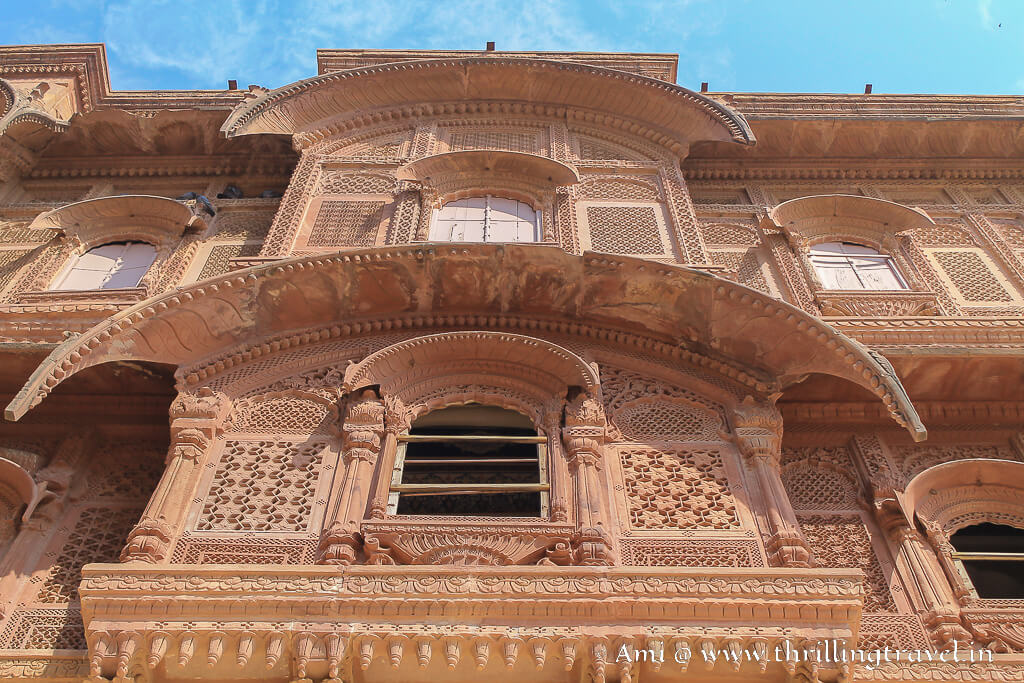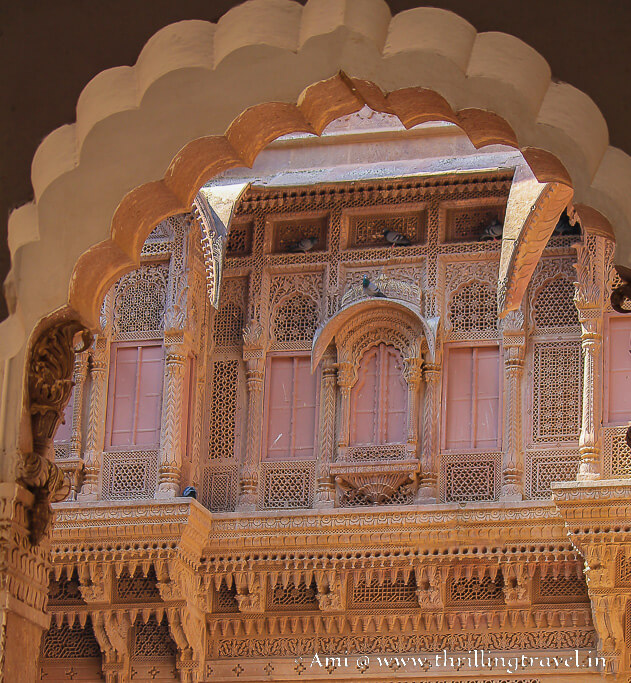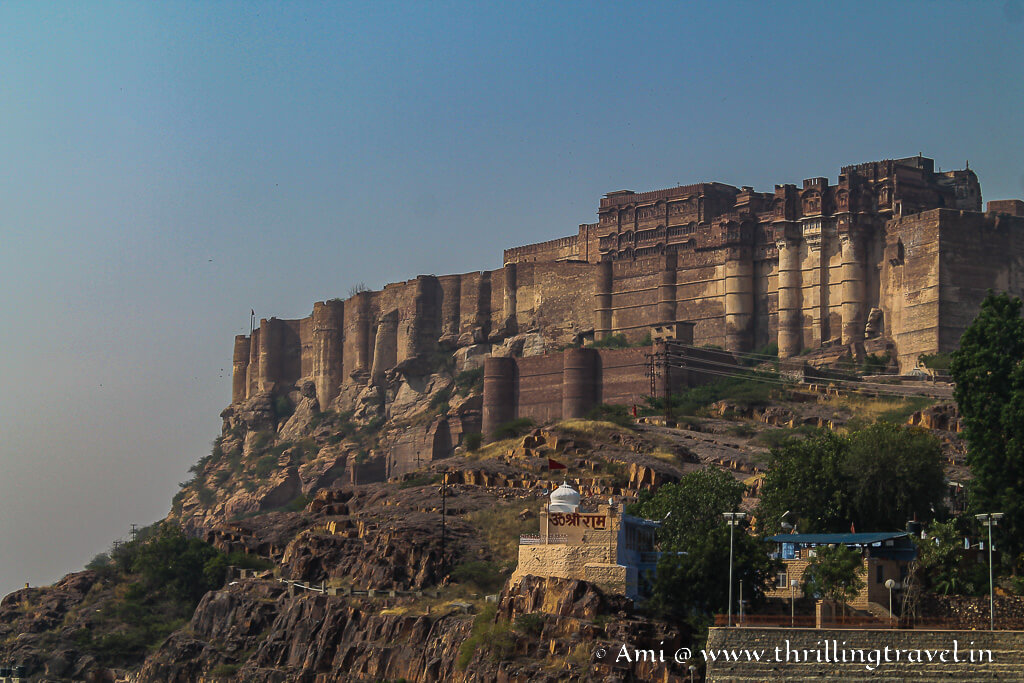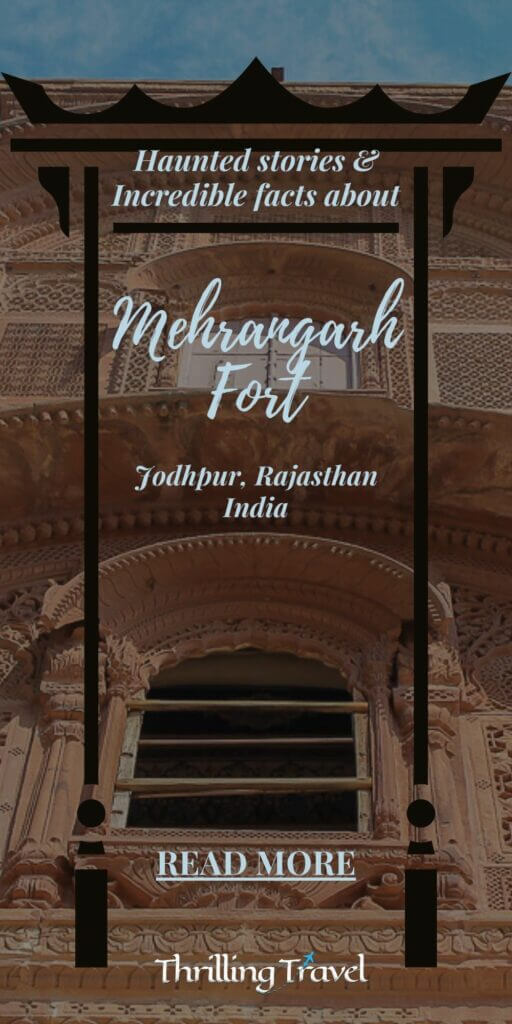An age old curse that people still believe in A story of a human sacrifice - a honor or a sin? Over 500 year old with historic artifacts These are just some of Mehrangarh fort facts. Let this Mehrangarh fort haunted story & facts become your very reasons to visit the epic Jodhpur fort.
It isn’t just history buffs like me who are enticed to visit the mesmerizing Mehrangarh fort. Anyone who has stumbled upon the astonishing facts about Mehrangarh fort in Jodhpur will be tempted to experience the place firsthand. The Mehrangarh fort story ranges from bone-chilling tales of murder & self-immolation to hair-raising facts related to its construction and architecture. Of course, there is that bit about an age-old Mehrangarh fort curse – one that the King tried to appease (another tale there!).

This post is a collection of 10 interesting facts about Mehrangarh fort and its stories. As you read through them, you will find the answer to the question – Why should you visit Mehrangarh fort in Rajasthan? So, lets begin –
Quick links to Mehrangarh Fort and Jodhpur
In case you are looking for some quick links to tours, places to stay and travel accessories for your Jodhpur trip, you can consider using these online options.
- Booking.com has several Jodhpur hotels listed on their site. You could use this link to browse and book the same.
- Viator.com offers several tours in and around Jodhpur. Here are some top rated ones that you should consider booking for your Mehrangarh and Jodhpur visit.
- GetYourGuide has various local tours and car bookings available that you can use to explore Jodhpur. They are also, well reputed and you can consider these highly-rated tours of Jodhpur
- For any of your travel needs or general shopping, consider using Amazon through this link.
Disclaimer: This article includes affiliate links. This means that at no cost to you, I will receive a small commission if you purchase through my link. Thank you for supporting me with this.
Contents
- 1 1. The Mehrangarh fort curse
- 2 2. The Mehrangarh Fort story of human sacrifice
- 3 3. Do you know how big the Mehrangarh fort is?
- 4 4. How long did it take to construct the Mehrangarh fort? – an astonishing Mehrangarh fort fact?
- 5 5. The land on which Mehrangarh fort stands has now been classified as a National geological monument
- 6 6. Mehrangarh fort haunted tales – murders & deaths
- 7 7. The story of mass self-immolation in Mehrangarh Fort
- 8 8. Epic location for epic movies
- 9 9. Mehrangarh fort is a hub for cultural & folk art
- 10 10. Why is the blue city of Jodhpur also, called the Sun city?
1. The Mehrangarh fort curse
Prior to Mehrangarh, the Rathore clan ruled from Mandore. However, the increased attacks prompted Maharaja Rao Jodha to consider moving his capital to a new location. That is when he chose the rocky hill called Bakurcheeria that overlooked Jodhpur as the ideal site for his new palace. The area was inhabited by one hermit called Cheeria Nathji (Lord of birds). When the Maharaja approached him to vacate the area, he refused.

When various attempts failed, the Maharaja sought the help of Karni Mataji (a divine warrior Lord) and that finally did the trick. Cheeria Nathji agreed to move but not before laying a curse on Mehrangarh fort. He told the Maharaja that his land will always suffer from scarcity of water.
It turned out that Jodhpur was prone to droughts. Many locals still attribute this to the age-old Mehrangarh fort curse of Cheeria Nathji while some just believe in a rational explanation.
2. The Mehrangarh Fort story of human sacrifice
Though the Maharaja sought to appease the hurt hermit by providing him with a home and a temple close to Mehrangarh fort, the effect of the curse could not be undone. Many priests and wise men suggested a human sacrifice be made to reduce the strength of this curse.

One of the residents – Rajaram Meghwal came forward and voluntarily offered to be the sacrifice. His only condition was that his family was to be provided for eternity. He was thus, buried alive before the construction of this Jodhpur fort.
This is the gruesome Mehrangarh fort story of human sacrifice – which remains mortalized by way of a small tablet honoring Raja Ram Meghwal. You will find this just after you enter the Dedh Kangra Pol. And true to his word, the descendants of his Rajaram Meghawal are still supported by the Rathore trust.
3. Do you know how big the Mehrangarh fort is?

So far, I have shared the intriguing stories of the Mehrangarh fort. Let me tell you one of the many Mehrangarh fort facts related to its size. The magnanimous fort occupies 1200 acres of land. It is spread over 5 km and has walls that are 120 feet high. There are 7 big gates to the expansive courtyards and palaces of Mehrangarh fort. Check out the details of all this in this mega travel guide to Mehrangarh Fort.
4. How long did it take to construct the Mehrangarh fort? – an astonishing Mehrangarh fort fact?
The construction of this epic fort began in 1459 by Maharaja Rao Jodha. However, it continued throughout the span of all the subsequent rulers. And there were 29 of them. Each one of them added or modified to the fort. In short, the construction of Mehrangarh fort took over 500 years.

Given this time span, you will find that there is no single type of architecture within the fort. You will find shades of Marwar along with a touch of Mughal style. What is more is that when you visit the various palaces inside Mehrangarh fort like Moti Mahal, Phool Mahal, Takhat Niwas & Sheesh Mahal – you will find that their grandeur shines through in extremely different styles.
5. The land on which Mehrangarh fort stands has now been classified as a National geological monument
It isn’t just the fort that is historically significant. In fact, it is the land on which it is built that is even more precious. The Geological survey of India has classified as a National geological monument (like the St. Mary’s island of Malpe), this land has been identified as the Jodhpur Malani igneous suite contact that dates back to the Precambrian age. It is an important feature of the Thar desert and the Aravalli range.

Now called the Rao Jodha desert park, this area has numerous volcanic rocks and sandstone formations that are over 600 million years old. The entire park is around 72 hectares and one can also, see the native birds and reptiles when they visit the place.

Located off the coast of Malpe in Karnataka is yet another National Geological monument of India. The St. Mary’s island has columnar basalt rocks that date back to the age when Madagascar was attached to India.
6. Mehrangarh fort haunted tales – murders & deaths
These Mehrangarh fort stories are not so well known. In fact, you will find that most guides in Mehrangarh fort do not talk about them. There is the tale of Maharaja Rao Ganga who smoked opium and strayed onto a parapet – only to fall to his death in 1530s. Some even say that his own son – Maldeo pushed him over the ledge but then, there is no conclusive evidence of that.
Another chilling tale is that of Maharaja Ajit Singh in the 1720s who was murdered by his own son Abhai Singh. It is believed that the son was promised the throne of Mehrangarh by the Jaipur Maharaja and the Mughals – provided he managed to kill his father.

There are a few other tales that I have come across but none of them are verified. One of them includes Maharaja Man Singh killing his prime minister and the other involves Maharaja Jaswant Singh throwing off his concubine from the window as he was startled by his father’s arrival. As I understand the same concubine served as a mistress to his father.
7. The story of mass self-immolation in Mehrangarh Fort

As you enter the Loha gate of Mehrangarh fort, you will see saffron handprints along its arches. These were made by women who performed the act of Sati (self-immolation) upon the death of Maharaja Ajit Singh (the same one who was murdered by his son). Of the 16 prints, five belong to the Queens and the rest to the concubines.
8. Epic location for epic movies
You might have already seen Mehrangarh fort- even if you have not visited Jodhpur. How?

Well, many epic movies have been shot here. You might have seen it in the popular sequences of 2012 DC classic – The Dark Knight rises or maybe in some of the Bollywood movies like Shuddh Desi Romance or Hum Saath Saath hai. The most recent is the popular musical web drama series – Bandish Bandits.
9. Mehrangarh fort is a hub for cultural & folk art
The Rathores (rulers of Mehrangarh fort) were great patrons of art. These range from the miniature paintings that you will still see in the various galleries of the fort to dance and music that is still performed by local and international artists here. On a regular day, you will see the local artists by the gates, showcasing their skills. You will be able to see a puppeteer with his many dolls or a folk dancer balancing many pots as she matches the beats of her accompanying musicians.

There are two major festivals that are hosted at Mehrangarh fort to continue the tradition of encouraging music and art. The first takes place in October and is called the Jodhpur Rajasthan International Folk Festival while the 2nd known as the Sacred Spirit festival celebrates Sufi music in February.
In addition to that, during Dusshera, you will still find locals thronging the Chamunda Mataji temple – keeping alive the age-old traditions.
10. Why is the blue city of Jodhpur also, called the Sun city?

First off, do you know why Jodhpur city is called the Blue city? I mean, it is obvious from the painted blue homes but why have they been painted so?
There were several explanations given –
- The homes that are painted blue belonged to the Brahmin community in service of the Royal house of Jodhpur. In early times, this city was called Brahmapuri.
- Some say it was to combat the blazing heat of the city
- Yet another explanation was that the homes were getting attacked by termites and there was a belief that the blue color helped keep them away.
Irrespective of the reason, the name is totally justified by the view that you can witness from Mehrangarh fort. However, what is not so clear is why would it be called Sun City. Well, that is partly owing to the fort itself.
The Rathores were suryavanshis or worshippers of Sun. This is said to have imparted the name of Sun city to their capital Jodhpur. In fact, they actually had named their fort as Mihirgarh – Mihir meaning sun and garh refers to fort. However, the local dialect changed the name to Mehrangarh.
Ah well, those are some reasons aka stories that will lead you straight to Mehrangarh fort. In fact, to help you plan your visit, I have put together a complete guide to Mehrangarh fort. The post has a complete tour of attractions and includes all the useful tips that you will need to plan a visit here.

Tempted to visit Mehrangarh fort Jodhpur? Don’t worry, I got you covered. Check out this ultimate guide to Mehrangarh fort with all the key attractions to see and tips to visit
Before you go, pin this
Share your wanderlust by pinning this up on your boards.



Popularly referred to as a Restless Ball of Energy. My Mom refuses to entertain my complaints about my equally restless daughter & assures my husband that I was born with a travel bug.
I am a Post-Graduate in Marketing by qualification and a travel blogger by passion. Besides travel, I enjoy photography and if you don’t find me at my desk, I would be out playing badminton or swimming or just running. I believe in planning for every long weekend through the year. And when I cannot travel physically, I travel virtually through this travel blog. My travel stories have also, got published on various websites and magazines including BBC Travel, Lonely Planet India and Jetwings. I have recently published my first book – When Places Come Alive – a collection of stories that are based on legends, landscapes, art and culture of a place which is available in both ebook and paperback format.
You might also like these posts –

What a fascinating place to visit! I’ve never heard of this fort but the history is truly impressive. It’s impressive it took over 500 years to complete and the condition is still pretty good. I can imagine it makes a great venue for events. I was also interested by the blue houses in Jodphur and the reasons behind it. Whatever it is, it makes for a really vibrant and beautiful scene!
Thanks Lisa. The blue houses is the reason why Jodhpur is called the blue city. So much to see in this fort and so many stories that keep coming out. Hope you plan to visit.
Such a fascinating history and set of tales related to the Mehrangarh Fort. I can understand why these draw people to visit – even if stories of drought, murder and sacrifice were true. Truly amazing to see the final shape created after 500 years and so many additions. Certainly a distinct structure to look for in movies. We would be certain not to miss the view of the blue city of Jodhpur.
Thanks Linda. Frankly these facts are the reason why people love visiting Mehrangarh
Loved reading your post about Mehrangarh fort. Your stories and interesting facts really bring it alive. The tales of curses, human sacrifice, and murders are so engaging, as well as learning more about the scale of the fort, how it was built, and the geological relevance of the site itself. Would love to visit and to experience the local culture and folk art at the same time.
Glad you like it Kavita. Hope you can plan your visit soon. There is plenty I am sure that I have missed too.
I have visited Jodhpur and have been inside the Mehrangarh fort but I didn’t visited it properly. I was travelling with a group and everyone decided to do the zip line rather than visit the fort, so that’s what we did. However, from the lines, I noticed how big the fort it. No wonder it took 500 years to build. The architecture and the decorations are so intricate. You are right, nobody told us about the chilling stories of the murders that happened here. It was interesting to read about the saffron handprints at the entrance to the fort. I remember seeing them but our guide didn’t mention them or tell us their story.
Time to visit again Joanna. This time it might be a zipline plus the tour of the fort. 🙂
Why – who does not love to hear about the stories that made great places great. You sure made my imagination come alive with the tales of curses and human sacrifice behind the Mehrangahr fort. The photo of the Blue city is amazing – it reminds me of Greek islands and was surprised to know the possible reasons behind. All in all a great read.
Thank you so much Adele. Glad you enjoyed the read
Meherangarh Fort has been on my wishlist for a long time. Hope I’ll get to visit here sometime soon. Interesting to know about the curse & droughts here. 1200 acres of land?!!!! Oh my Goodness! Good to know that it also includes Rao Jodha desert park and its volcanic rocks! Mass self-immolation reminds me of Padmavat. It would be quite intriguing to see these hand-prints in person.
Self immolation was so common back then and every time I saw those prints, I kind of felt sad. There are some in almost every Rajasthan fort.
Going to the Mehrangarh Fort sounds interesting. I’m curious to learn the tales and information about this location because I adore history. It has such stunning architecture. The local musicians and dancers’ performances are something else I would like to see. Jodhpur’s famous blue-painted houses are really charming. These ten factors are more than enough to convince me to visit this place very soon!
Thanks Maria. Glad you are enticed to visit.
Mehrangarh fort looks amazing! And it has such and interesting and captivating story. I can’t believe that it took over 500 to built it, but that alone makes it even more special. It also looks so big that I think in order to properly see everything, a person would need a lot of time. Very cool that it was also featured in several movies.
Half a day is just not enough according to me. I feel you can visit it more than once and still keep finding new stories.
The Mehrangarh fort is truly mesmerizing with its rich blend of and Rajput and Mughal architecture and no wonder it took 500 years to build it.The gruesome tales of human sacrifice and self immolation are chilling and astonishing at the same. The aerial views of the Jodhpur city with houses painted in blue are awesome . It’s also wonderful that you get the explore the local art , music and puppet shows to get a glimpse of the culture of the city.
Thanks Puloma. This is one awesome place – filled with stories to visit.
Nothing about the haunted pleasure palace inside Mehrangarh Fort? I was expecting to read that at least….
I have only heard of the concubine who was thrown out of the window. I suppose there may be many other tales but none that I could verify or hear in entirety.